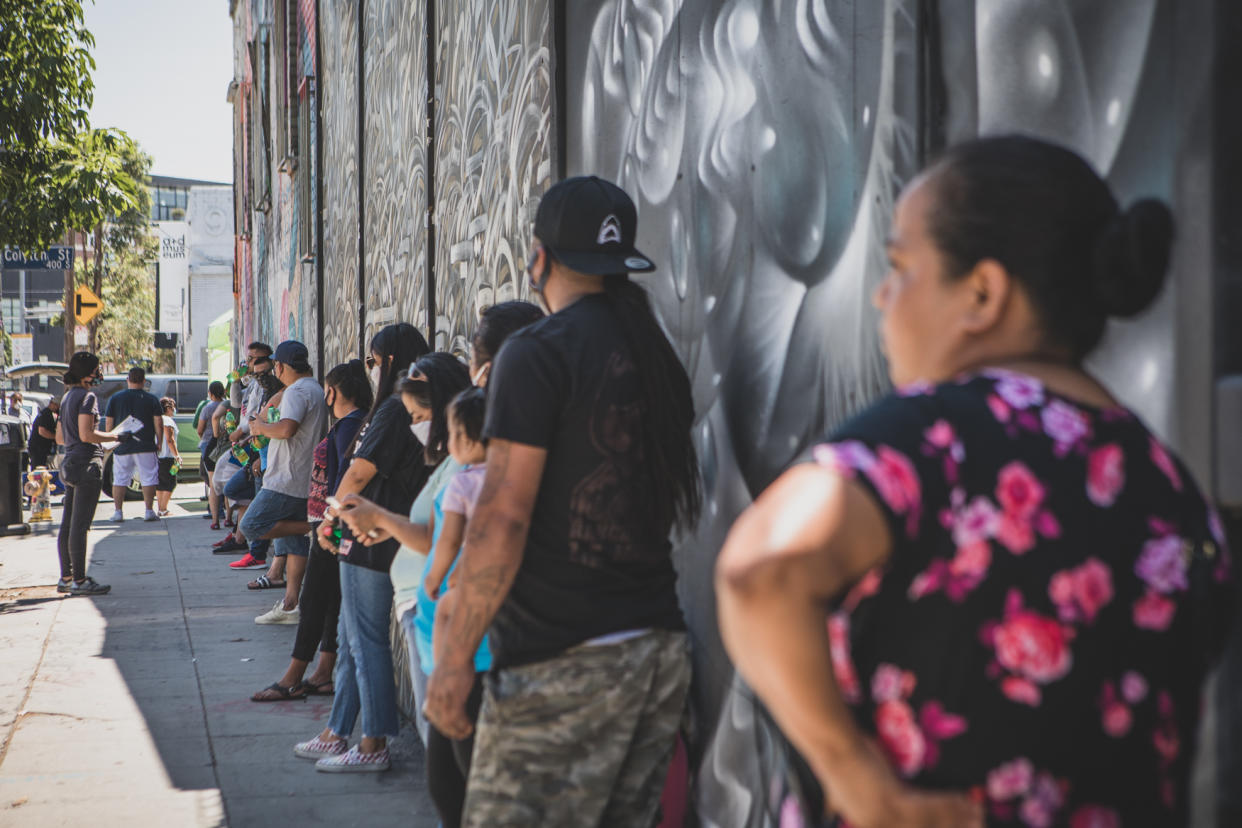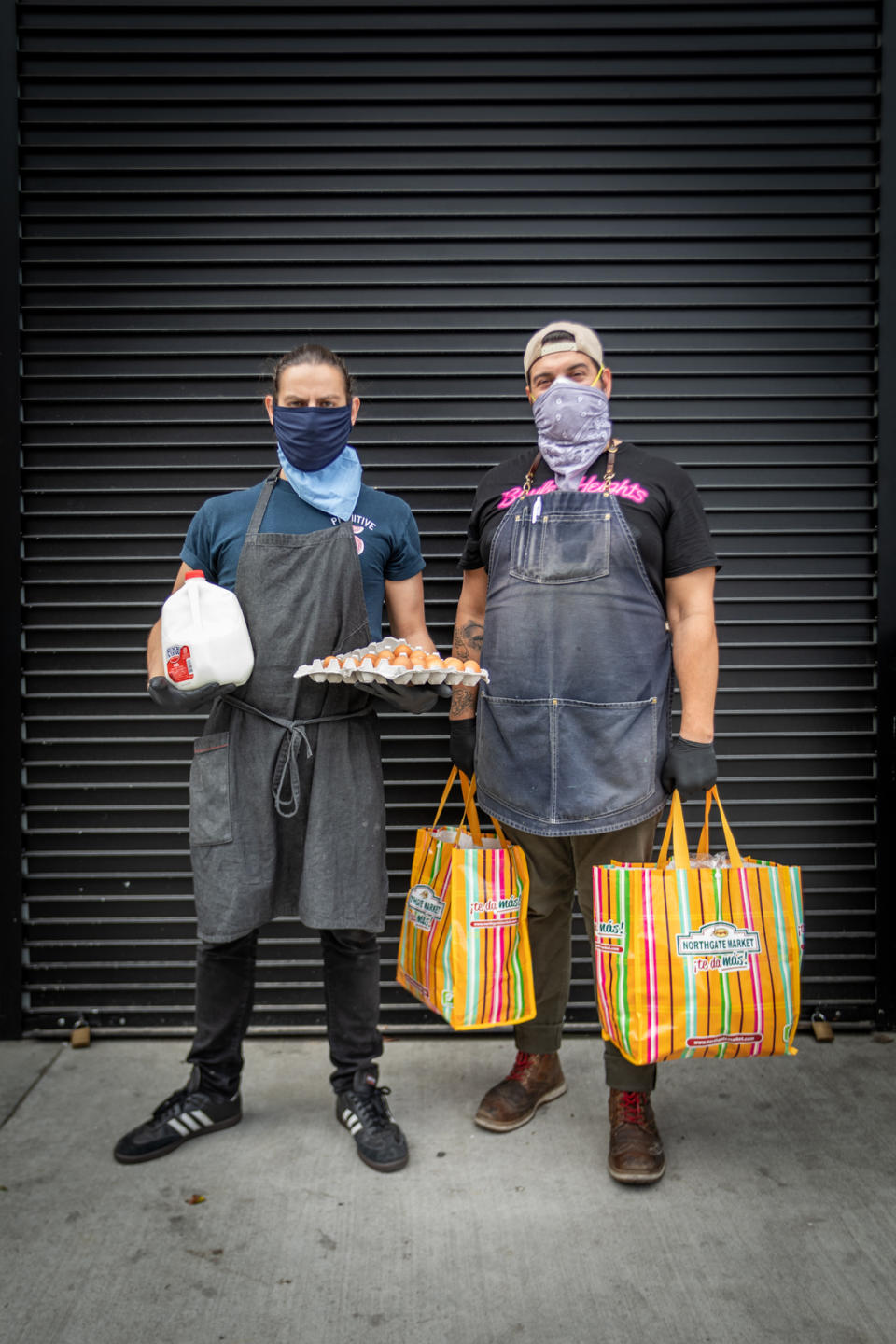As pandemic increases shutdowns, undocumented restaurant workers face unique struggle: 'How am I going to make ends meet?'

“It’s hard to wake up and think, ‘How am I going to make ends meet?’” says Efren, one of 10.5 million undocumented immigrants living in the United States. “I’m a 47-year-old man, not just anyone is willing to give me a job.”
That’s especially true considering his field of employment — the restaurant industry, made up of an estimated 10 percent of undocumented immigrants across the nation, and 40 percent in major cities like Los Angeles, where Efren (who declined to share his last name) is based. The current situation — particularly the new statewide closure order of all restaurants and bars in California — has folks like Efren, who has a wife and three children, reeling.
“The day that COVID-19 [shutdowns] started happening, my life totally changed,” says Efren, who immigrated to the United States in 1989 from a small village in the Mexican state of Zacatecas and who now, after living more than half his life in America, feels this is home. He started working in restaurants out of necessity, he says, working his way from dishwasher to ultimately a line cook at an upscale restaurant — before he was laid off due to the coronavirus, Efren explains to Yahoo Life (in Spanish, which has been translated here). He had started working again, part-time, when dine-in had been allowed to resume.
“But then I got laid off again,” he says. “We are very desperate after this second round of closures, especially since the restaurant where I worked at closed permanently. ... I don't have any type of income coming in anymore to pay bills and expenses, to be honest, I feel very desperate and defeated by this situation.”
Undocumented workers are particularly vulnerable to being hit hard by the coronavirus outbreak. Some have been forced to live off of any available savings or help from organizations — or to take exploitative jobs, such as making masks.

“In the beginning, the only option was working these sweatshop-like environments for 10 to 12 hours a day,” explains Stephen Murray, founder of LA Kitchen Migrants, an organization that shares stories and information about undocumented workers in the restaurant industry. “They get paid per mask that they would manufacture, which is five cents per mask. On a good day,” he tells Yahoo Life, “they are not even able to manufacture 100 masks.”
LA Kitchen Migrants is just one of many organizations across the country that have sprung up to provide aid during the pandemic. Murray has been able to fundraise his initial goal of $20,000 through donations and crowdfunding and hopes to continue providing resources to undocumented workers for as long as he can.
“Shedding light on a huge community that is really disproportionately affected, I think, is a really important message to get out,” Murray says. “They’re just not recognized by the government. Without people raising awareness, there will be no change.”
Another organization that is focused on helping this community is nonprofit No Us Without You, founded by Othón Nolasco and Damian Diaz of Va’La Hospitality in Los Angeles. Their efforts have reached as far as New York and, through monetary and product donations, they’ve been able to feed hundreds of families each week since March.
“When the shutdown happened in Los Angeles, we knew that the most severely impacted would be our undocumented sisters and brothers who work in the back of the house,” Nolasco tells Yahoo Life. “They wouldn’t be eligible for unemployment or any other government assistance, even though they pay into the system. They are taxed every paycheck for services they don’t benefit from.”
And now, in California and many other states facing surges, the situation feels even more dire. “Damian and I both agree that this second shutdown is going to be much worse,” says Nolasco. “We believe that so many more restaurants and bars will unfortunately not be able to survive financially. In our program we are seeing the amount of applications for assistance dramatically increase. The majority of the undocumented, back-of-house families we serve are in dire financial need of assistance. They haven’t worked in over four months. They’re at risk of being evicted for nonpayment of rent. This pandemic is going to destroy the hospitality industry as we knew it.”
In New York, 24-year-old Humberto (who also declined to share his last name) was working at the Fulton, a restaurant owned by the famed chef Jean-Georges Vongerichten, before he got laid off due to coronavirus lockdowns. He came to the United States from Mexico when he was just 5 years old and is undocumented.
“The money that we have is only going to go so far, there’s legit no money coming in, so what do you do next?” wonders Humberto. “That’s a struggle that you really start to feel.”
For Humberto, the pandemic has not only affected him financially but personally. A friend who used to work with him at another Jean-Georges restaurant died from the virus earlier this year. The CDC recently reported that Latinos are hospitalized from the coronavirus at four times the rate of white Americans, reinforcing that the virus disproportionately affects Latino communities.
Like Efren, Humberto and his family have partially relied on help from organizations during the pandemic, such as Make the Road New York. Recently, the organization called on New York Gov. Andrew Cuomo to “establish a $3.5 billion fund to ensure that excluded workers get the relief they need to survive the crisis,” since undocumented immigrants don’t receive a stimulus check or unemployment.
Efren and Humberto are just two individuals who are part of the larger immigrant workforce that helps run the United States economy. It is estimated that undocumented immigrants pay an average of $11.6 billion in state and local taxes per year, and Latinos make up half of the U.S.’s unauthorized immigrants and often work low-paying, front-line “essential” jobs — putting at risk their health and safety when most don’t have health insurance.
“From what I've seen, just other people around me, they’re just thinking about surviving,” says Humberto. “They’re willing to go out and just work.”
“We are the fastest growing segment in the U.S., so what happens to us will reverberate,” Priscilla Gonzalez, a campaign manager for Mijente, a national social justice organization, recently told USA Today. She, along with other activists, call for both long-term structural changes and immediate relief to the undocumented community. The inability for undocumented workers to survive post-COVID-19 will affect the U.S. financially.
Video: Pandemic’s impact on undocumented farm workers could have global repercussions
As No Us Without You moves forward, and the pandemic deepens, Nolasco and Diaz have plans to expand their resources and help the community directly, such as with recently established delivery and tutoring initiatives. “People have had to sell their cars for as little or as much as they can weeks after COVID hit to stay ahead,” says Diaz. “Our delivery program will be a vital part of our cause moving forward, allowing for individuals to not expose themselves to potential health risks on public transport or different ride shares.” And helping children with English reading and writing comprehension is just the start for their tutoring programs.
So how do we fix the system and prepare for another COVID-like crisis — not to mention weather the one we are still in?
As far as the restaurant industry goes, Nolaso says that he hopes hospitality leaders will find a way to rebuild and replace what’s broken in the system, like relying on single-digit margins and long hours with low pay, with better solutions. Murray believes that people need to not be afraid of telling the truth about what’s really happening in kitchens and how reliant restaurants are on undocumented workers.
“I have faith in God that things will return back to normal,” says Efren. “I ask that the people and companies that are able to lend us a hand, to help us. We have our whole lives here — we pay taxes, we have moved this country forward, just like anyone else. It’s not fair to help some and not others, just because we’re undocumented. We work hard to move ourselves forward.”
“Even though I wasn’t born here, I say I’m from here. I grew up here, I’ve always lived here and I will continue to live here,” he says, adding, “This pandemic has totally affected all of us [undocumented] immigrants that live in this country and I hope that one day we are all equal, because we are all human and we have the same rights. I hope God can lift us up from this pandemic. Amen.”
See the latest coronavirus news and updates. According to experts, people over 60 and those who are immunocompromised continue to be the most at risk. If you have questions, please reference the CDC’s and WHO’s resource guides.
How to maintain your physical and mental health during the pandemic
Taking care of a loved one with COVID-19? Here’s how to stay healthy
Q&A with Dr. Kavita Patel: How to keep your family safe and maintain your mental health
Read more from Yahoo Life
Why didn’t summer kill the coronavirus? Experts explain what White House officials were missing
‘I’m proud of my disability’: How a wheelchair ramp and the ADA changed my life
Want daily lifestyle and wellness news delivered to your inbox? Sign up here for Yahoo Life’s newsletter.
